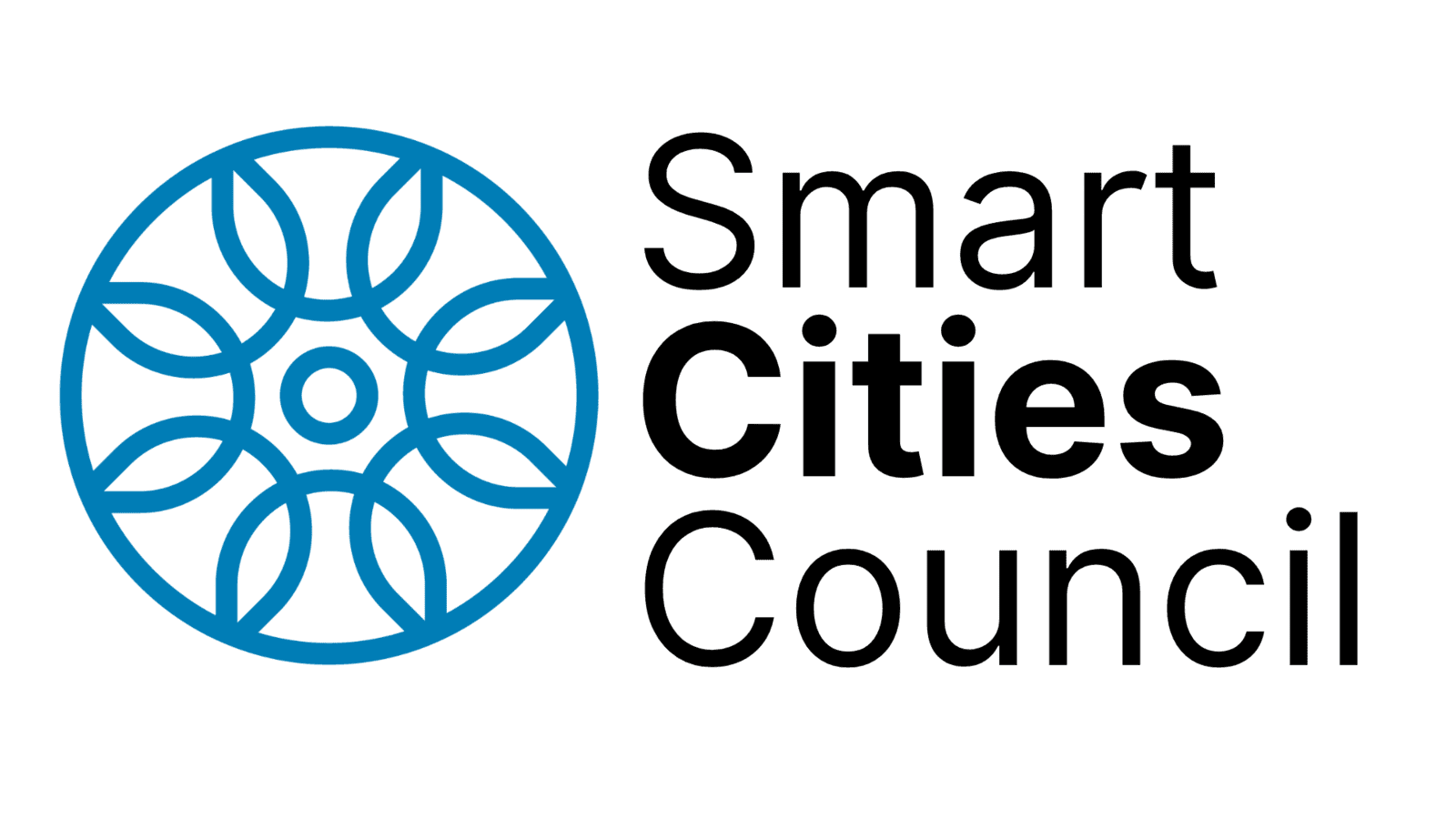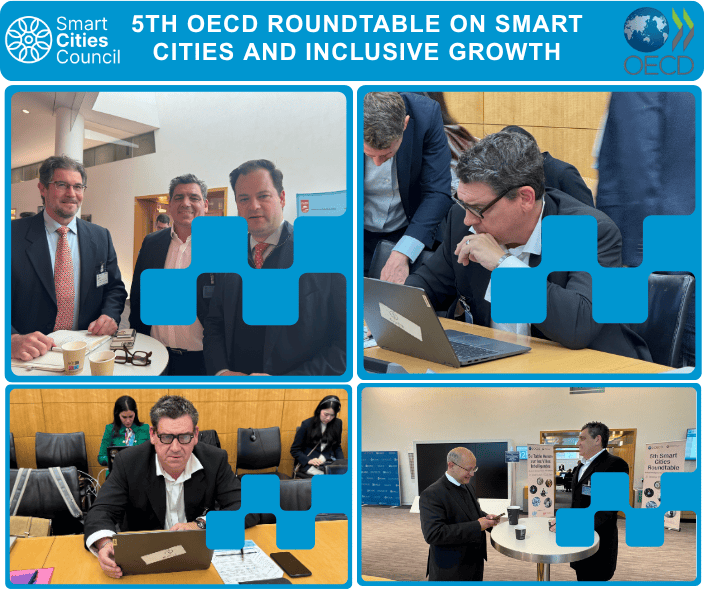Paris, 27 October 2025 - OECD Headquarters
Leaders from across the world gathered in Paris for the 5th OECD Round Table on Smart Cities and Inclusive Growth, a high-level global forum exploring how artificial intelligence (AI) is reshaping the urban future. Co-hosted by the OECD and Korea’s Ministry of Land, Infrastructure and Transport, the event united city mayors, national governments, private-sector innovators, and international organisations to exchange strategies, challenges, and solutions around AI-driven urban transformation. For a full Agenda, Click Here.
AI as a Catalyst for Sustainable Urban Futures
This year’s theme — “Artificial Intelligence for Advancing Smart Cities” — reflected a growing global consensus that AI is no longer a futuristic idea but an operational necessity for cities confronting climate, infrastructure, and social pressures.
Speakers highlighted that over 30% of smart-city applications are already AI-powered, enabling real-time decision-making in transport, housing, land use, and public-service delivery. Yet alongside these gains come equally complex ethical and governance challenges — from data bias to privacy and environmental cost — that require deliberate, human-centred design.
Sessions that Bridged Ideas and Action
Four interactive sessions anchored the day:
- Deploying AI in Smart Cities — examining how cities at different stages of digital maturity can align AI projects with sustainability goals.
- Unlocking AI for Sustainable Urban Development — featuring city leaders from Sendai, Dubrovnik, Amsterdam, and others, discussing how AI can drive low-carbon and equitable growth.
- Enabling Adoption of AI for Urban Development — focusing on capacity-building, funding models, and ethical frameworks to guide implementation.
- AI and the Future of Urban Development — exploring how AI will redefine governance, work, and human identity in cities of tomorrow.
Smart Cities Council at the Table
In the closing session, Corey Gray, President & Chair of the Smart Cities Council (SCC), contributed to the discussion on the future of urban development and the role of AI in shaping tomorrow’s cities.
Gray’s remarks centred on the importance of human agency, creativity, and ethics in the AI era — emphasising that cities must design technology to enhance human potential, not replace it.
“As machines take on more of our analytical and operational work, our true value will come from creativity, empathy, and imagination,” Gray shared. “These human qualities must guide the next wave of smart city design.”
A Forum of Global Perspectives
The Round Table gathered a distinguished group of participants, including mayors from Sendai (Japan), Dubrovnik (Croatia), and Paris (France), alongside senior representatives from OECD, UN-Habitat, WSP, GIZ, and innovation leaders from Korea, Finland, Germany, and the Middle East.
Across all sessions, one theme was clear — AI must serve people, not the other way around. Participants underscored the need for transparent governance, inclusive design, and collaborative frameworks that ensure AI drives equitable and sustainable outcomes.
The Smart Cities Council Value Add
Following these discussions, the Smart Cities Council sees a significant opportunity to contribute to the global ecosystem by providing practical tools and programs that help cities benchmark, build capacity, and collaborate across regions.
Through its upcoming initiatives — including city capability-building programs, digital readiness frameworks, and international knowledge exchanges - SCC aims to help governments and organisations move from concept to action in a way that is measurable, inclusive, and globally connected.
“Events like the OECD Round Table show how shared learning accelerates progress,” said Gray. “The Smart Cities Council exists to help cities operationalise that learning - connecting ideas to implementation through real collaboration.”
Looking Ahead
- Join us in Barcelona for the Smart City Expo World Congress next week.
- SCC will continue this global dialogue through upcoming engagements — including participation in the World Urban Forum 2026 in Baku, Azerbaijan — where it will further advance conversations on digital governance, capacity building, and human-centred innovation.
“By aligning technology with humanity, we can create cities that are not just smart — but truly liveable,” Gray concluded.
Schedule
| Role | Name | Position | Organisation |
|---|---|---|---|
| Opening remarks by co-organisers | Soo-Jin Kim | Deputy Head, Cities, Urban Policies and Sustainable Development Division | OECD/CFE |
| Opening remarks by co-organisers | Jong Bin Yoon | Director of Urban Economy Division | Ministry of Land, Infrastructure and Transport (MOLIT) of Korea |
| Remarks by supporting organisations | Dyfed Aubrey | Chief of Office | UN-Habitat Office for EU |
| Remarks by supporting organisations | Vera Moosmayer | Head of Directorate S III, Spatial Planning and Regional Policy | German Federal Ministry for Housing, Urban Development and Building (Video message) |
| Session 1 | |||
| Moderator and co-host: | Peter Sailer | Head of Project, International Smart Cities Network | Deutsche Gesellschaft für Internationale Zusammenarbeit (GIZ) GmbH |
| Setting the scene: | Vilas S. Dhar | President | Patrick J. McGovern Foundation |
| Panellists: | Kazuko Kohri | Mayor | Sendai (Japan) |
| Panellists: | Robert Thomann | CEO | Smart City Mannheim (Germany) |
| Panellists: | Aino-Maija Vaskelainen | Program manager of the EU project AI4Citizens | Municipality of Tampere (Finland) |
| Panellists: | Gudrun Schwarz | Senior Policy Officer, Division “Smart Cities and Regions” | German Federal Ministry for Housing, Urban Development and Building |
| Panellists: | Dong-Ha Lee | Deputy Director, Urban Economic Division | Ministry of Land, Infrastructure and Transport (Korea) |
| Panellists: | Estefania Tapias | Head of Smart & Digital | WSP Middle East |
| Session 2 | |||
| Setting the scene: | Mato Franković | Mayor of Dubrovnik (Croatia) | |
| Demonstration on processing geographic data and AI: | Milene Göknur Jubin | Co-founder & CEO | GlobeholderA |
| Panellists: | Jan Duffhues | Team Leader Data, Analysis and Coordination | Department of Land Use and Sustainability, Amsterdam (The Netherlands) |
| Panellists: | Gianni Rossi | Innovation Manager | Arezzo (Italy) |
| Panellists: | Milan Bogunovic | Programme Director, Digital Planning | Ministry of Housing, Communities & Local Government (United Kingdom) |
| Panellists: | Silvia Verace | Head of Public Infrastructure Development & Data Strategy | A2A E-Mobility / A2A Group |
| Panellists: | Gaetano Volpe | CEO | Latitudo 40 |
| Discussant: | Rudiger Ahrend | Head of Division, Economic Analysis | Data and Statistics Division, OECD/CFE |
| Session 3 | |||
| Moderator: | Stefano Marta | Head of Unit, Smart and Sustainable Cities | OECD/CFE |
| Setting the scene: | Laurence Liew | Director of AI Innovation | AI Singapore (Virtual) |
| Panellists: | Marie Bernard | Digital Project Manager | Nantes Metropole, (France) |
| Panellists: | Jürgen Spanhove | Manager Digital Strategy & Governance, District09 | City of Ghent (Belgium) |
| Panellists: | Elena Deambrogio | Department of European Funds and PNRR Ecological Transition Service | City of Turin (Italy) (Virtual) |
| Panellists: | David Kim | Associate Research Fellow | Korea Research Institute for Human Settlements (KRIHS) |
| Panellists: | Thomas Cottinet | Director of ECOLAB | Ministry of Environment (France) |
| Panellists: | Martin Memmel | Head of Smart City Living Lab | German Research Center for Artificial Intelligence |
| Panellists: | Federico Fernandez | CEO | URBANLY |
| Discussant: | Lucia Cusmano | Head of Division, SMEs and Entrepreneurship Division | OECD/CFE |
| Session 4 | |||
| Moderator: | Oscar Huerta Melchor | Project Manager, Smart and Sustainable Cities Unit | OECD/CFE |
| Setting the scene: | Geoffroy Boulard | Vice-President of the Greater Paris Metropolis - Mayor of the 17th arrondissement of Paris (France) | |
| Panellists: | Shuichiro Nakamura | Director for Digital Planning and Coordination, Digital Strategy Division | Tokyo Metropolitan Government (Japan) |
| Panellists: | Marlene Damerau | Smart City Unit Lead, City of Gelsenkirchen | Project Lead URBAN.KI |
| Panellists: | Juraj Hostak | Director General, Innovation and Strategic Development | Ministry of Investment, Regional Development and Informatization (Slovak Republic) |
| Panellists: | Cristina Martinez Pinto | Founder | PIT Policy Lab (Mexico) (Virtual) |
| Panellists: | George Harrington | Urban Futures Lead | ARUP Foresight |
| Panellists: | Corey Gray | President | Smart Cities Counil |
| Discussant: | Carlos Santiso | Senior Counsellor on Global Partnerships for Digital Government and Artificial Intelligence (AI) in Government | OECD/GOV |
About Smart Cities Council
Founded in 2012, the Smart Cities Council is the world’s longest-running and most trusted ecosystem advancing smart, sustainable, and equitable communities. Through collaboration across government, business, and academia, SCC drives innovation in technology, design, and culture to create a world that is safer, more beautiful, enabled, resilient, equitable, and sustainable, for everyone.For more information on Smart Cities:
- Smart Cities Council Website
- Smart Cities Council News
- Smart Cities Council Events
- Smart Cities Council Education
- Smart Cities Council Contact Form
- Social Media via the tabs


